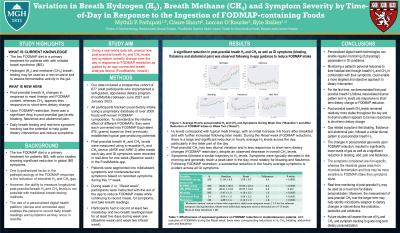Monday Poster Session
Category: Functional Bowel Disease
P1938 - Variation in Breath Hydrogen, Breath Methane, and Symptom Severity by Time-of-Day in Response to the Ingestion of FODMAP Containing Foods
Monday, October 23, 2023
10:30 AM - 4:15 PM PT
Location: Exhibit Hall

Has Audio

Mythili Pathipati, MD
Massachusetts General Hospital
Boston, MA
Presenting Author(s)
Mythili Pathipati, MD1, Lorcan O'Rourke, MA2, Claire Shortt, PhD2, Aonghus Shortt, PhD2, Kyle Staller, MD, MPH1
1Massachusetts General Hospital, Boston, MA; 2FoodMarble Digestive Health Ltd, Dublin, Dublin, Ireland
Introduction: The low FODMAP diet is a primary treatment for patients with irritable bowel syndrome (IBS). One hypothesized factor in the pathophysiology of FODMAP response is the reduction of intestinal hydrogen (H2) and methane (CH4) gas. Currently available clinic-based breath testing, however, does not enable real-time measurement. Here we assessed how breath H2 and CH4 levels from an app-connected, breath analysis device (AIRE and AIRE 2, FoodMarble Digestive Health) and symptom severity varied by time of day before and following the restriction of dietary FODMAPs.
Methods: We studied 677 patients between June 2021 and January 2023. All patients completed a baseline questionnaire and tracked usual dietary intake and GI symptoms (measured on a scale of 0-10). Patients were segmented into those with moderate/severe symptoms (mean score ≥ 3.3 for at least one symptom, n=335) and mild/absent symptoms (mean score < 3.3, n=342). The device was used for at least 5 days/week (at least 2 meals/day and 2 breath tests/meal) over the period. Patients logged their meals from a food composition database which was converted into FODMAP Equivalent (g-eq) to standardize relative effect of different FODMAPs. At the end of the baseline week, patients were instructed via an app to restrict their FODMAP intake (“Reset week”) with measurement of FODMAP intake, symptoms, and corresponding H2 and CH4 breath levels during the day.
Results: Average age was 45 years, mean BMI was 24.7, with 40% male and 60% female. The top 3 symptoms at baseline (median, IQR) were bloating (2.6, 1-4), flatulence (1.5, 0-3), and abdominal pain (1.5, 0.2-3.1). With reduction of FODMAPs during the Reset week, there were corresponding reductions in H2, CH4, bloating, abdominal pain and flatulence severity (Table 1). Mean hourly H2 levels varied markedly over the day, reaching a nadir by mid-morning and before reaching a peak by the end of the day, with the hourly pattern for symptoms following a similar trajectory (Figure 1). FODMAP restriction resulted in significant reduction in hourly mean H2 levels across the day, with a more modest impact on CH4 levels.
Discussion: This study suggests that H2 as opposed to CH4 may be strongly influenced by short-term dietary changes and could be a useful biomarker of response to FODMAP restriction in addition to improvement in symptoms. Future studies will assess to the use of H2 and symptom tracking to guide long-term dietary personalization.

Disclosures:
Mythili Pathipati, MD1, Lorcan O'Rourke, MA2, Claire Shortt, PhD2, Aonghus Shortt, PhD2, Kyle Staller, MD, MPH1. P1938 - Variation in Breath Hydrogen, Breath Methane, and Symptom Severity by Time-of-Day in Response to the Ingestion of FODMAP Containing Foods, ACG 2023 Annual Scientific Meeting Abstracts. Vancouver, BC, Canada: American College of Gastroenterology.
1Massachusetts General Hospital, Boston, MA; 2FoodMarble Digestive Health Ltd, Dublin, Dublin, Ireland
Introduction: The low FODMAP diet is a primary treatment for patients with irritable bowel syndrome (IBS). One hypothesized factor in the pathophysiology of FODMAP response is the reduction of intestinal hydrogen (H2) and methane (CH4) gas. Currently available clinic-based breath testing, however, does not enable real-time measurement. Here we assessed how breath H2 and CH4 levels from an app-connected, breath analysis device (AIRE and AIRE 2, FoodMarble Digestive Health) and symptom severity varied by time of day before and following the restriction of dietary FODMAPs.
Methods: We studied 677 patients between June 2021 and January 2023. All patients completed a baseline questionnaire and tracked usual dietary intake and GI symptoms (measured on a scale of 0-10). Patients were segmented into those with moderate/severe symptoms (mean score ≥ 3.3 for at least one symptom, n=335) and mild/absent symptoms (mean score < 3.3, n=342). The device was used for at least 5 days/week (at least 2 meals/day and 2 breath tests/meal) over the period. Patients logged their meals from a food composition database which was converted into FODMAP Equivalent (g-eq) to standardize relative effect of different FODMAPs. At the end of the baseline week, patients were instructed via an app to restrict their FODMAP intake (“Reset week”) with measurement of FODMAP intake, symptoms, and corresponding H2 and CH4 breath levels during the day.
Results: Average age was 45 years, mean BMI was 24.7, with 40% male and 60% female. The top 3 symptoms at baseline (median, IQR) were bloating (2.6, 1-4), flatulence (1.5, 0-3), and abdominal pain (1.5, 0.2-3.1). With reduction of FODMAPs during the Reset week, there were corresponding reductions in H2, CH4, bloating, abdominal pain and flatulence severity (Table 1). Mean hourly H2 levels varied markedly over the day, reaching a nadir by mid-morning and before reaching a peak by the end of the day, with the hourly pattern for symptoms following a similar trajectory (Figure 1). FODMAP restriction resulted in significant reduction in hourly mean H2 levels across the day, with a more modest impact on CH4 levels.
Discussion: This study suggests that H2 as opposed to CH4 may be strongly influenced by short-term dietary changes and could be a useful biomarker of response to FODMAP restriction in addition to improvement in symptoms. Future studies will assess to the use of H2 and symptom tracking to guide long-term dietary personalization.

Figure: Figure 1: Average Hourly Fermentation and Symptom Severity During Baseline Week (“Baseline”) and After Reduction of FODMAP Intake (“Reset”). At this aggregate level, changes in breath hydrogen levels correspond with typical timings of meals, with an initial increase 3-6 hours after breakfast and with further increases following later meals. During the “Reset” week, where FODMAP intake was reduced, there is a large and significant reduction in hourly average hydrogen levels across the day, particularly in the latter part of the day. There is less diurnal variation in the hourly average methane levels. The hourly pattern of symptoms follows a similar trajectory to hydrogen levels. The levels are typically elevated in the morning (especially for flatulence) and generally reach a peak later in the day, most notably for bloating and flatulence. Following FODMAP restriction, a substantial reduction in the hourly average symptoms is evident, especially for bloating and flatulence.
Disclosures:
Mythili Pathipati indicated no relevant financial relationships.
Lorcan O'Rourke: FoodMarble Digestive Health Ltd – Employee.
Claire Shortt: FoodMarble Digestive Health – Employee. FoodMarble Digestive Health – Employee.
Aonghus Shortt: FoodMarble Digestive Health Ltd – Employee, Owner/Ownership Interest.
Kyle Staller: Anji Pharmaceuticals – Consultant. Ardelyx – Consultant. Gelesis – Consultant. GI Supply, a Laborie company – Consultant. Ironwood Pharmaceuticals – Grant/Research Support. ReStalsis Health – Consultant. Sanofi – Consultant. Urovant Sciences – Grant/Research Support.
Mythili Pathipati, MD1, Lorcan O'Rourke, MA2, Claire Shortt, PhD2, Aonghus Shortt, PhD2, Kyle Staller, MD, MPH1. P1938 - Variation in Breath Hydrogen, Breath Methane, and Symptom Severity by Time-of-Day in Response to the Ingestion of FODMAP Containing Foods, ACG 2023 Annual Scientific Meeting Abstracts. Vancouver, BC, Canada: American College of Gastroenterology.

